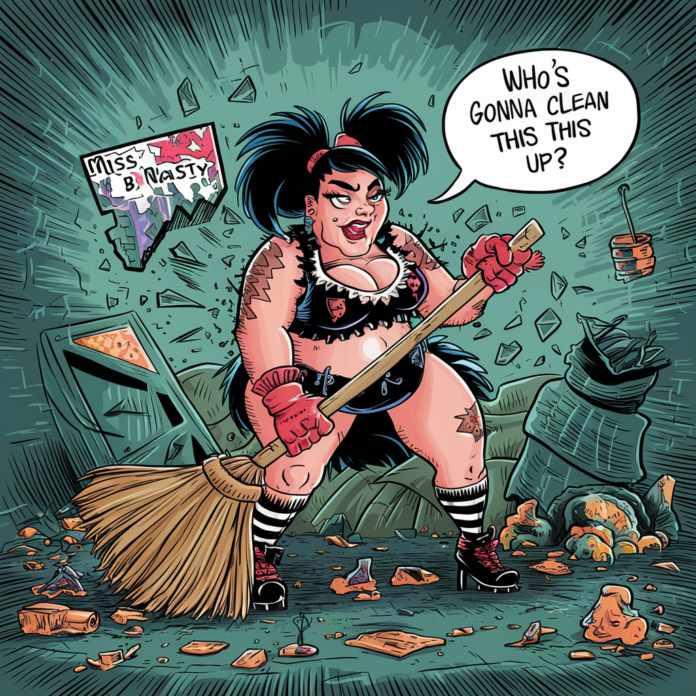Introduction
The rise of sexually explicit content creators like Miss B Nasty has sparked heated debates about digital eroticism, platform accountability, and societal boundaries. As her unapologetically raunchy videos dominate social media timelines, critics and fans clash over questions of morality, censorship, and labor in the adult entertainment-adjacent space. But beyond the outrage or applause lies a more pressing question: When viral sexuality pushes limits, who’s left holding the mop? From shadow-banning battles to the psychological toll on creators, this article dissects the messy aftermath of internet shock culture—and who ultimately pays the price for our collective thirst.
1. The Shock Economy: How Provocation Pays (Until It Doesn’t)
Miss B Nasty’s brand thrives on the razor’s edge of acceptability, leveraging TikTok’s algorithm with twerk compilations and simulated sex acts that toe the line of community guidelines. Her success mirrors a broader trend where creators monetize controversy, banking on platforms’ inconsistent enforcement to amplify reach. But this game of digital chicken has consequences: demonetization, account purges, and the psychological whiplash of building a career atop shifting rules. While audiences gorge on the spectacle, the creator bears the burden of constant reinvention—each viral hit followed by the exhausting scramble to dodge deletion. The real cost? A content ecosystem where performers are both the architects and the cleanup crew of their own exploitation.
2. Platform Hypocrisy: Silicon Valley’s Sex Panic
Social media giants posture as morality police, banning nudity while allowing suggestive thirst traps to flourish—so long as they drive engagement. Miss B Nasty’s recurrent suspensions highlight this paradox: platforms profit from the traffic her content generates, then scapegoat her when advertisers complain. The cleanup here isn’t just about deleted posts; it’s about the human moderators (often underpaid and traumatized) sifting through explicit reports, and the creators left to navigate opaque appeals processes. Meanwhile, corporate policies remain vague by design, ensuring plausible deniability while the backlash lands on performers, not the algorithms that promoted them.
3. The Labor Behind the Fantasy: Burnout, Backlash, and the Creator Grind
Beneath the sweat-glossed veneer of viral clips lies an underdiscussed truth: sex-adjacent creators work harder than most. Miss B Nasty’s output requires choreography, editing, and relentless audience engagement—all while fielding harassment, copycat accounts, and the pressure to escalate antics for diminishing returns. The cleanup extends to mental health, as creators juggle their public persona with private exhaustion. Unlike traditional adult entertainers, they lack union protections or standardized pay structures, leaving them vulnerable to platform whims. The result? A burnout pipeline where performers are discarded once the hype fades, with no safety net to catch them.
4. Cultural Aftermath: Who Inherits the Taboo?
When figures like Miss B Nasty push boundaries, the ripple effects land beyond their DMs. Younger audiences internalize these performances as normative, while parents and educators scramble to contextualize them. The cleanup shifts to society: schools addressing premature sexualization, therapists unpacking unrealistic body standards, and legislators flailing at regulation. Yet the creator rarely sticks around to deal with these consequences—they’re too busy surviving the next algorithm shift. This asymmetry forces a uncomfortable question: If viral sexuality is the modern carnival, who’s left sweeping up the emotional and social debris once the crowds disperse?
Conclusion: The Unwanted Janitorial Duty of Virality
Miss B Nasty’s saga isn’t just about one creator’s hustle—it’s a microcosm of digital culture’s broken feedback loop. Platforms profit from provocation, audiences consume without consequence, and performers shoulder the fallout. The cleanup is systemic: clearer policies, ethical monetization, and societal honesty about our complicity. Until then, we’ll keep pointing fingers at the mess while refusing to hand anyone a mop.


